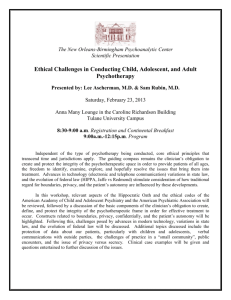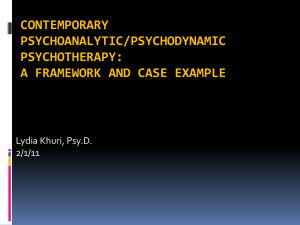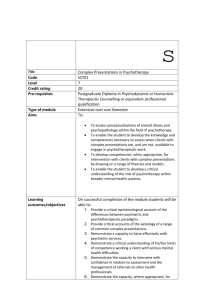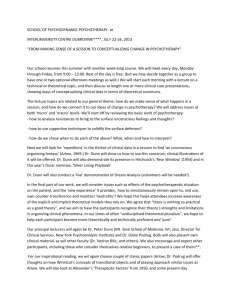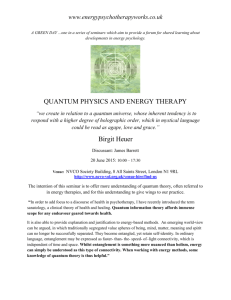FAQ on the M.Sc. in Psychoanalytic Psychotherapy
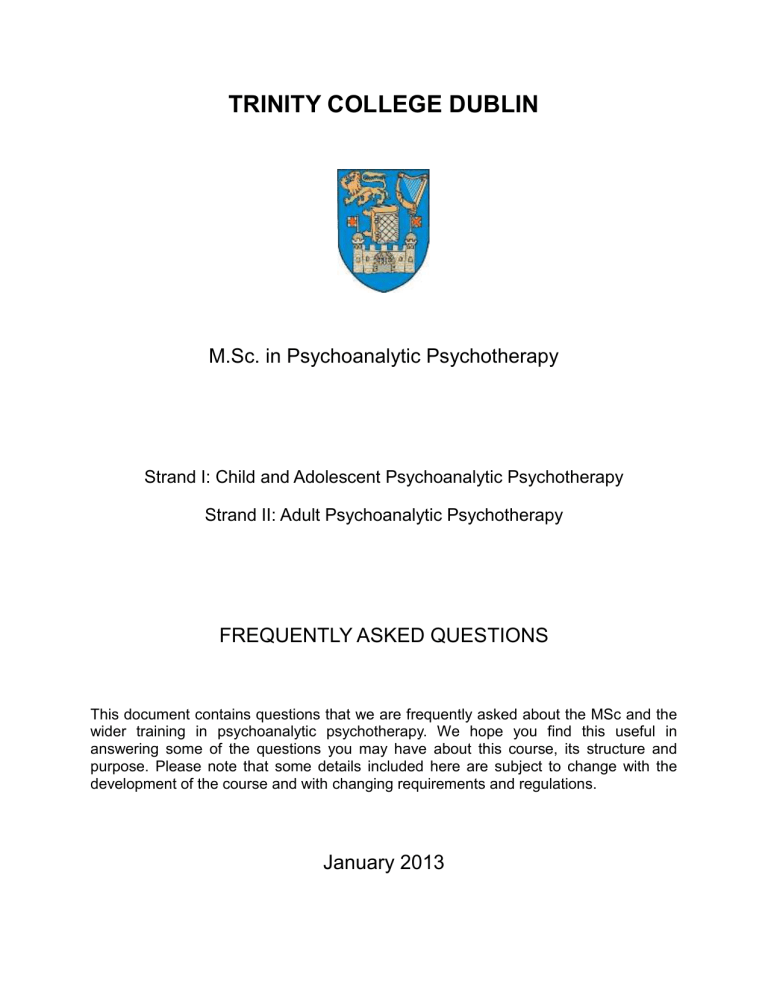
TRINITY COLLEGE DUBLIN
M.Sc. in Psychoanalytic Psychotherapy
Strand I: Child and Adolescent Psychoanalytic Psychotherapy
Strand II: Adult Psychoanalytic Psychotherapy
FREQUENTLY ASKED QUESTIONS
This document contains questions that we are frequently asked about the MSc and the wider training in psychoanalytic psychotherapy. We hope you find this useful in answering some of the questions you may have about this course, its structure and purpose. Please note that some details included here are subject to change with the development of the course and with changing requirements and regulations.
January 2013
FREQUENTLY ASKED QUESTIONS
COURSE ORIENTATION AND CONTENT
Q. What is Psychoanalytic Psychotherapy and how does it differ from the other modalities?
A.: Psychoanalytic psychotherapy aims to help the client to develop a broader and fuller experience. For many clients - children, adolescents or adults who feel stuck in their lives or who struggle with despair or with overwhelming anxiety, the work is often about helping to find a way of handling their lives. This work is centred on the relationship between therapist and client and on the experiences of relating, holding and containment. We are concerned with what is taking place in the here and now and the fuller picture of the person’s life as they have grown up, as they live their lives outside of sessions and as they move to a different experience in their lives. We are concerned with what is unconscious – what is split off from our immediate experience – and we find that by helping to make such processes more conscious, we reveal their place in the here and now of the person’s life. In comparison to other modalities, psychoanalytic psychotherapy tends to be relatively long-term and to involve a thorough exploration of the person’s experience and what lies underneath this.
The field of psychoanalytic psychotherapy is an ever-evolving, ever-expanding one. While it draws strongly on the ideas of certain theorists, including Freud, Klein, Bion and Winnicott, it also draws on the collective experience of practitioners in the discipline and elsewhere.
Psychoanalytic approaches emphasise that alongside our conscious lives, we also have unconscious motivation and that it is important to explore the relationship between these two levels of psychological life in order to address the situation of the person. Our experience emerges from our earliest experiences and the relationships of our childhood are key to our development of a secure sense of self and the world.
As a course, we welcome the tightening of regulations for psychotherapy training in recent years as it means that there are now better safeguards for people seeking out psychotherapy in
Ireland. The regulations now in position mean that everyone entering the profession engages in at least four years of formal postgraduate study on a recognised programme in order to meet the academic requirements for entry into the discipline, with a minimum of at least seven years formal study. For further information, please consult the website of the Irish Council for
Psychotherapy ( http://www.psychotherapy-ireland.com
) and of the European Association for
Psychotherapy ( http://www.europsyche.org
).
Q. What is the overall focus of the MSc in Psychoanalytic Psychotherapy at Trinity
College?
A.: The MSc in Psychoanalytic Psychotherapy brings together two previously separate programmes – one in child and adolescent psychotherapy, the other in adult psychoanalytic psychotherapy -, which have run in Trinity College and elsewhere for approximately 20 years.
As a course, we look to the development of students toward work in the area of psychoanalytic psychotherapy. This course is designed for applicants who are interested in working using a psychoanalytic framework. However, we also recognise that not everyone who does the course will continue into one of the training institutes following completion of the MSc and that some may enter the programme with the intention of not pursuing later clinical training and practice.
We recognise as well that some students may draw on what they learn in this course to develop
an understanding of patients in mental health, to understand children they work with as teachers or health professionals or bring this to other and diverse contexts. In these instances, a student may not decide to apply to continue training into years three and four. The course balances theoretical with clinical input and encourages a high level of exploration and discussion of ideas and the process of clinical work.
The course is particularly oriented toward those psychoanalytic approaches that have defined this field and with a particular emphasis on the theoretical and clinical contributions of Sigmund
Freud, Melanie Klein, Wilfred Bion and Donald Winnicott. The course combines academic and clinical components, with a great deal of attention given to the development of a reflective position. We particularly emphasise self-awareness and the development of oneself along the process of training. The experiential components of the course – personal therapy and infant observation – run alongside the academic inputs and, taken together and in light of one another, give students the stimulus and the space to develop themselves, their understanding and their ability to engage in clinical practice.
Q.: How is the course structured?
A.: The course is made up of two strands:-
Strand I: Child and Adolescent Psychoanalytic Psychotherapy;
Strand II: Adult Psychoanalytic Psychotherapy.
At the point of application for the course, you choose which of these two strands you wish to pursue. While some of the teaching will be specific to Strand I or Strand II, most of the teaching will be shared due to fact that the same theoretical basis exists for both programmes, with divergences taking place around issues of psychotherapeutic technique with children, adolescents and adults.
The course’s modules are as follows: Module 1: Theoretical Frameworks I (10 ECTS); Module
2: Infant Observation I (10 ECTS); Module 3: Infant, Child & Adolescent Development (10
ECTS); Module 4: Clinical Concepts (5 ECTS); Module 5: Infant Observation II (10 ECTS);
Module 6: Theoretical Framework II (10 ECTS); Module 7: Clinical Practice (5 ECTS); Module 8:
Research/Dissertation (30 ECTS). Modules 1 to 4 are completed in the first year of the course, with modules 5 to 8 being completed in the second year of the course.
Classes generally involve some level of didactic teaching (particularly those concerned with the main theoretical frameworks), in addition to discussion. All teachers on the course have trained in psychoanalytic psychotherapy and are experienced practitioners and there is a continued linking between theory and practice.
The course is hosted by the Department of Psychiatry in Trinity College Dublin. The course executive committee is as follows:
Course Director:
Course Coordinator:
Course Administrator:
Strand I Coordinator:
Strand II Coordinator:
John O’ Connor
Theresa Merrigan
Ann Daly
Sherry Doyle
Mary Pyle
Q.: Is it possible to commence in one Strand and to move to the other Strand during the course?
A.
Students apply for entry onto one of the two Strands of the programme, with a possibility of moving strands during the course, subject to the approval of the course committee. For a student moving into Strand I, clinical supervision and clinical work will be concerned with children and adolescents. For a student moving into Strand II, in the same way, this work will take place with adults. During the course of the second year of the programme, students of
Strands I and II will attend separate modules concerned with issues of technique and clinical cases related to children/adolescents and adults respectively.
Q. What is the purpose of the Postgraduate Diploma in Psychoanalytic Psychotherapy?
A.
Should a student not meet all of the requirements of the MSc, an option is available under certain circumstances (related to the extent of modules that have been completed) to exit with a
Postgraduate Diploma (P-Grad.Dip) in Psychoanalytic Psychotherapy in Strand I or Strand II.
Students who pass each of the taught modules and the dissertation are eligible for the award of
M.Sc. in Psychoanalytic Psychotherapy. Students who pass each of the modules but do not complete the dissertation will be awarded the Post-Graduate Diploma in Psychoanalytic
Psychotherapy. In most instances, a decision around your application will be made within a week of this interview.
APPLICATION PROCESS
Q.: How do I apply for the MSc in Psychoanalytic Psychotherapy?
A.
All applications for the course are now submitted online through Trinity College’s Graduate
Studies Office. You can apply for this course through the following url: http://www.tcd.ie/courses/postgraduate/az/course.php?id=DPTMD-PPSY-2P09
The application process through Graduate Studies is relatively straightforward and instructions are clear. In addition to this form, we ask applicants to submit a personal statement outlining what has brought you to apply for this course at this time. Your application for the course will only arrive to us when it is fully complete. At this point, the Course Administrator will send you a supplementary form, on which you can submit your personal statement. This will be sent from the following email address: amdps@indigo.ie
. Following receipt of this form, we will begin to organise an interview for you with members of the course committee. We anticipate that this interview will be organised within a time frame of approximately 3 weeks following receipt of your application to the course.
Q.: What do I need in order to apply successfully for this course?
A.: We encourage you to apply if you have an interest in this field. The following are required:
Academically : A second class honours primary degree or higher is generally required. For those who are in professions that now require a primary degree but that did not require this at the time the person entered this profession (including nursing), an exception can be made. Decisions around such exceptions are made with Trinity’s Graduate Studies Office.
Work Experience : For the adult strand, work in a related field is desirable. For the Child and
Adolescent Strand, applicants will usually work in an environment where they work with children.
Personal Factors : You are not required to have a strong knowledge of psychoanalysis, though some sense of its basic thrust is certainly desirable. Engagement in personal therapy also demonstrates a recognition of the nature of this field.
Readiness : This relates to the timing of the application in relation to your life circumstances. In going through the process of application, there will be an opportunity to appraise whether you are in a position to embark on this course at this time.
Q.: Is there a minimum age requirement for entry onto the course?
A.
: No, we do not have a minimum age requirement for this course. However, we encourage applicants to consider carefully the time of application to the course due to the nature of the commitment involved.
Q.: I do not have a primary degree but have a professional qualification. Could my professional qualification be taken as a basis for entering the course?
A. Yes, in some instances. College is very clear that students of particular professions which now require degrees at point of entry – including nursing – but who completed training at a time when this was not a prerequisite have a strong case for entry to these courses. Also, credit is given when students have completed other professional qualifications and have worked at a high level within their field of work. If, for instance, you have trained as a counsellor or psychotherapist along a formal channel, this may be used as the basis for an appeal to College.
PRACTICAL DETAILS
Q.: What are the time commitments on the course?
A.
The course is part-time, with most lectures and seminars taking place on Tuesday Evenings
(6 p.m. to 10 p.m.) and Wednesdays (10 a.m. – 5 p.m.) during the two twelve week College terms. This is the case for the two years of the course. Some teaching also takes place on an irregular basis out of term in order to support the Infant Observation module. Students attend personal therapy (from first year), conduct their infant observation in their own time and outside of this schedule.
Q.: What are the fees and other expenses involved in doing the course?
A.
The fees are currently €7,250 per year of the MSc for EU students (with non-EU students and students who do not meet certain requirements about residency in Ireland paying approximately double this). Fees are subject to change and are determined by Graduate
Studies. Personal therapy sessions are at a rate of approximately €80 per hour.
Q.: Can I work while doing the course?
A.: Yes. Most of the students on the course have maintained employment while doing the course. If you are working full time, it is usually necessary to engage with employers to negotiate time off. We advise that you consider the course as requiring two days of your time at a minimum. That is, you need at least two days a week (during term time in particular) in order to engage in the course. You may need to set time aside also for reading and to settle into the course.
Q.: How do I go about organising personal therapy?
A.: All students on the course are required to attend once-weekly personal therapy from the beginning of the course. Students are encouraged, though not required, to commence personal therapy from the time they are offered a place on the programme in order to provide support for the commencement of the course. A list of training analysts, with contact details, will be provided to students at the time when an applicant formally accepts a place on the course.
Q.: If I am currently seeing a therapist, do I need to end this and move to a therapist from the course’s list of approved analysts?
A.: Yes. We recognise that this can be a difficult decision for a student. This is however necessary as a part of the course’s overall model of training. Should a student need to change therapists, we encourage students to make this transition carefully and to give this time. We encourage students to discuss this with the relevant strand coordinator and to find an arrangement that fits the circumstances.
Q.: Do I see training clients as a part of the MSc in Psychoanalytic Psychotherapy?
A.: No. The course provides the academic and experiential foundation necessary for commencing clinical work within a psychoanalytic framework. We believe that it is very important for students to develop a strong foundation prior to starting this work in order to develop a strong and assured framework in meeting the complexities of this work. Students generally commence seeing training clients at the beginning of the two years of further training at one of the two connected institutes.
Q.: Could you recommend reading to help me to decide if this is the kind of course that I would enjoy and learn from?
A.: We recommend the following as good introductions to psychoanalytic thinking and practice:
Mainly Adult Psychoanalytic Psychotherapy:-
Casement, P. (2001). On Learning from the Patient . London: Brunner-Routledge.
Sandler, J. Dare, C. & Holder, A. (Eds.) (1992). The Patient and the Analyst: The Basis of the
Psychoanalytic Process . London: Karnac.
Bateman, A. & Holmes, J. (2002).
Introduction to Psychoanalysis: Contemporary Theory and
Practice . New York: Brunner-Routledge.
Mainly Child and Adolescent Psychoanalytic Psychotherapy:-
Waddell, M. (1998). Inside Lives: Psychoanalysis and the Growth of the Personality.
London:
Tavistock.
Gerhardt, S. (2004). Why love matters: How affection shapes a baby’s brain . London: Routledge.
Q.: What supports are available on the course?
A.: We appreciate that training in psychotherapy is demanding at a number of levels. We also appreciate that as a part of the MSc, students may be making decisions around progression into years three and four and may require some assistance in thinking around this. In addition to personal therapy (from the beginning of first year), further supports are also available on the programme. The clinical coordinator for either Strand is available to meet with students on that
Strand to discuss issues that are emerging for them in relation to the process of training. Each student on the course will be assigned an individual mentor who will provide both support from and feedback from the course committee regarding the student’s progression. This relationship will also provide an opportunity for the student to provide feedback to the course. This feedback, along with feedback provided around the course modules provided through the college’s system of gathering feedback on modules, will inform developments on the programme.
TRAINING FOLLOWING THE MSC
Q.: How do I apply for years three and four?
A.
Applications for years three and four are made through the institutes concerned. These applications are made in the second year of the MSc. The institutes interview those who apply and offers are made subject to the successful completion of the MSc.
Q.: What are the expenses associated with years three and four of training?
A.
For students currently going through the MSc, institute fees of approximately €3,750 per year apply. In addition to this, students attend personal therapy twice weekly and clinical supervision once weekly, with fees of approximately €80 per session for these. As students are usually embarking on this course as a part of the fuller four year training, you may need also to consider the expenses in the years following the course. As students engaged in psychotherapy training are now required to complete four years of continuous training, it is important to bear in mind the costs of the subsequent two years should you apply and be accepted for this.
Q.: Where are classes in years 3 and 4 held?
A.
For those who continue in training beyond the MSc, classes are currently organised once a month for 10 months of the year at weekends in Baggot Street, Dublin 2.
Q.: Is it possible to take a break after the MSc for a number of years and then return to complete the training?
A.
No. According to the current accreditation regulations as set out by the European Association for Psychotherapy, a student must complete these four years consecutively.
____________________________________________________________________________
If you have any other questions about the course that have not been answered here or at the
Open Evening, please contact Ann Daly, Course Administrator at amdps@indigo.ie
, or the
Course Director, Dr. John O’ Connor, at joconno8@tcd.ie
.

